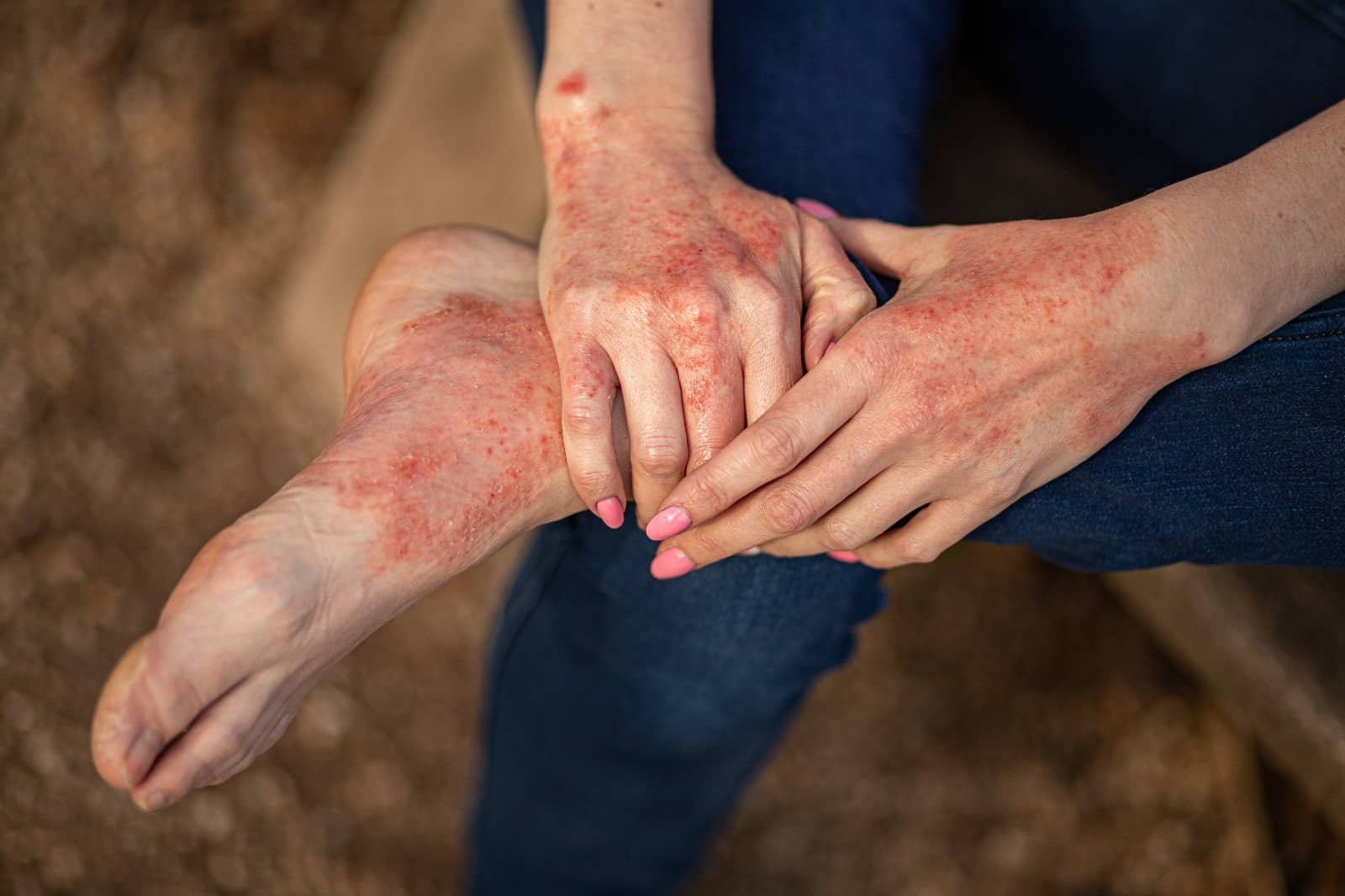How to Manage Seasonal Eczema Flare-Ups: Tips for Winter and Summer.

What Causes Seasonal Eczema?
Seasonal eczema is triggered by environmental changes that affect the skin’s barrier, leading to dryness, irritation, and inflammation. Cold, dry winter air and hot, humid summer conditions can both cause flare-ups. Other factors, such as allergens, sweat, and sudden temperature changes, can exacerbate the symptoms.
What is the Biggest Trigger for Eczema?

The most common trigger for eczema is dry skin, which worsens during the cold months. However, heat and sweat in the summer can also irritate the skin, causing flare-ups. Environmental allergens like pollen, dust, and pet dander can further contribute to seasonal eczema.
Read More: What Causes Eczema? Understanding the Triggers and How to Manage Them
What Season Does Eczema Flare Up the Most?
Eczema tends to flare up most during winter due to the lack of humidity, cold air, and indoor heating that dries out the skin. However, summer poses its own challenges as sweating, heat, and sun exposure can irritate sensitive skin.
What Does Seasonal Eczema Look Like?
How Eczema Looks Like in the Winter
In winter, seasonal eczema often causes itchy, red, and cracked skin, particularly on the hands, face, and areas exposed to cold air. The skin may appear flaky and excessively dry due to the low humidity levels.
How Eczema Looks Like in the Summer
In summer, eczema can look like red, inflamed patches of skin, often aggravated by sweating. These patches may appear more prominent on areas like the neck, elbows, and behind the knees. Sweat can also lead to irritation, making the skin sting or feel itchy.
Can Lifestyle Changes Help?
Absolutely! Adopting specific lifestyle changes can significantly reduce eczema flare-ups. From skincare routines to environmental adjustments, small changes can have a big impact on managing your symptoms year-round.
General Tips for Managing Eczema

Image by Freepik
Use topical steroids during flare-ups
Topical steroids are highly effective in managing inflammation and redness during eczema flare-ups. Always follow your doctor’s specific instructions for applying these medicated creams, as overuse can lead to side effects. Apply them only to the affected areas and consider using a moisturizer afterward to lock in hydration.
Take short lukewarm showers
Hot water may feel soothing, but it can strip your skin of its natural oils, leaving it dry and more prone to irritation. Keep your showers short—ideally under 10 minutes—and opt for lukewarm water instead. Use a gentle, fragrance-free body wash to avoid further aggravating your skin.
Use fragrance-free detergents
Even small amounts of harsh chemicals or fragrances in detergents can irritate sensitive skin. Switch to gentle, hypoallergenic, fragrance-free detergents to wash your clothes, towels, and bedding. Ensuring your fabrics are free of irritating residues can go a long way in preventing flare-ups.
Protect your skin from temperature changes
Sudden changes in temperature, such as moving from an air-conditioned environment into the summer heat or vice versa, can shock your skin and trigger eczema symptoms. Dress in layers to easily regulate your body temperature and protect your skin with breathable fabrics like cotton.
How to Manage Seasonal Eczema Flare-Ups in the Winter
As the temperature drops and the air gets drier, winter can take a toll on your skin, especially if it’s sensitive. The combination of cold winds, indoor heating, and low humidity can strip your skin of its natural moisture, leaving it dry, irritated, and uncomfortable. But don’t worry—protecting your skin during the colder months doesn’t have to be complicated. Here are some simple yet effective tips to keep your skin healthy and hydrated all winter long:
Use rich, oil-based moisturisers

Occlusive moisturisers work to lock in moisture, creating a protective barrier that prevents water loss from the skin. By doing so, this type of moisturiser effectively combats dryness and help keep your skin hydrated, soft, and healthy-looking throughout the day.
Install humidifiers
Maintaining proper indoor moisture levels is essential to prevent your skin from drying out, especially during colder months or in air-conditioned environments. Using a humidifier, keeping indoor humidity balanced, and staying hydrated can help your skin retain its natural moisture and stay healthy.
Wear protective clothing
Dress in layers to protect your skin from the harsh cold air, starting with a moisture-wicking base layer to keep sweat away. Add an insulating layer for warmth, like fleece or down, and finish with a windproof and waterproof outer layer. Avoid wearing wool directly on your skin, as it can cause irritation for some people.
Take vitamin D supplements
Reduced sun exposure during the winter months can decrease your body's natural production of vitamin D, a crucial nutrient for maintaining healthy skin. This deficiency may lead to dryness, irritation, or a dull complexion, as vitamin D plays a key role in skin repair and overall health. Taking steps to boost your vitamin D levels through diet, supplements, or safe sun exposure can help keep your skin looking and feeling its best.
How to Manage Seasonal Eczema Flare-Ups in the Summer
Summer’s heat and humidity require a different approach to eczema care:
Use lightweight moisturisers

Water-based options are a great choice for managing seasonal eczema in the summer. They keep your skin hydrated without clogging pores, which is especially important during warmer months when sweat and heat can easily irritate sensitive skin. By providing lightweight moisture, water-based products help soothe dryness and reduce flare-ups, leaving your skin feeling calm and refreshed all summer long.
Wear breathable clothing
Choose loose, lightweight fabrics like cotton or linen to help regulate your body temperature and minimise sweating. These materials allow your skin to breathe, reducing the risk of irritation and discomfort. Avoid synthetic fabrics like polyester, which can trap heat and moisture, making eczema symptoms worse. Prioritise comfort to keep your skin calm and irritation-free throughout the day.
Shower after sweating
Sweat can be a major trigger for sensitive skin, causing itching and irritation if left on for too long. After a workout, a long walk, or spending time in the summer heat, make it a habit to rinse off with lukewarm water. Hot water can strip your skin of natural oils, so always opt for a gentler temperature. Use a mild, fragrance-free cleanser to avoid additional irritation, and moisturise immediately after drying off to lock in hydration. This simple routine can help prevent sweat from aggravating your skin and triggering flare-ups.
Avoid sun exposure
Direct sunlight can be harsh on sensitive skin and may lead to eczema flare-ups. To protect yourself, apply a broad-spectrum sunscreen with at least SPF 30, preferably one designed for sensitive skin. Look for sunscreens that are mineral-based with ingredients like zinc oxide or titanium dioxide. When possible, wear hats, long sleeves, and sunglasses to protect your skin from UV rays. Try to plan outdoor activities for early morning or late afternoon to avoid peak hours when the sun is strongest. By taking these precautions, you can enjoy the outdoors without compromising your skin’s health.
When to Seek Expert Help for Seasonal Eczema
If your eczema isn’t improving with home care or is significantly affecting your quality of life, it’s time to consult a skin professional. Skin experts can recommend advanced treatments for eczema, prescribe medication, or offer tailored advice based on your specific triggers.
Take Control of Your Eczema Flare-Ups with Expert Guidance
Managing seasonal eczema doesn’t have to be overwhelming. By understanding your triggers and adopting a seasonal skincare routine, you can reduce flare-ups and keep your skin healthy year-round.
For persistent symptoms, don’t hesitate to seek professional help—your skin deserves the best care possible. Here at Skin to Heart , we offer a variety of products and treatment options specially selected to help manage seasonal eczema and provide expert guidance for your skin health. Book a consultation today to learn more about how we can support you in your journey towards healthy, happy skin. So why wait? Take control of your eczema and live confidently every season! Your skin will thank you.
- Tags: eczema sensitive skin
0 comments

